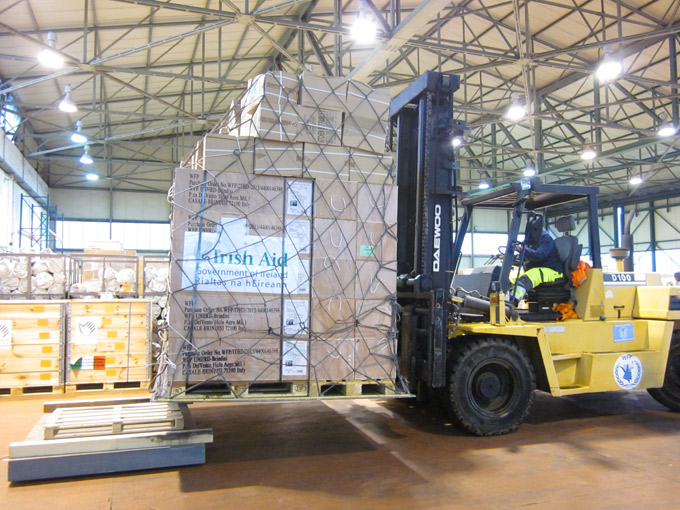Ireland’s Rapid Response Initiative in 2015
19/1/16
Irish Aid emergency supplies for dispatch at UNHRD Brindisi hub, Italy. Photo: UNHRD
Ireland’s Rapid Response Initiative, designed to respond quickly to humanitarian emergencies by deploying highly skilled specialists and sending emergency humanitarian supplies, had a busy year in 2015. 32 members of the Rapid Response Corps were deployed worldwide, with 305 tonnes of emergency relief supplies dispatched to assist over 70,000 people in need.
These included families and communities affected by the floods in Malawi, the earthquake in Nepal,, Nigerian refugees fleeing Boko Haram, and refugees in Serbia and Uganda.
The Rapid Response Initiative has been a central feature of Ireland’s humanitarian assistance programme since 2007. It is an operational tool designed to help save and protect lives, alleviate suffering and maintain human dignity, before, during and in the aftermath of crises.
There are two key elements to the Initiative:
- A roster of highly skilled and experienced professionals - Rapid Responders - (such as Engineers, Logisticians and Humanitarian Affairs Officers) who are willing to deploy at short notice to emergencies; and
- Pre-positioning and transportation of essential humanitarian supplies (such as blankets, tents, kitchen sets, mosquito nets and water cans) for use in emergency areas.
The pre-positioning of emergency humanitarian stocks occurs via the UN Humanitarian Response Depot (UNHRD) network of hubs around the globe. These hubs are strategically located - in Accra (Ghana), Brindisi (Italy), Dubai (UAE), Panama City (Panama) and Subang (Malaysia) - within airport complexes, close to ports and main roads. This ensures transport costs are kept to a minimum and permits the rapid dispatch of supplies in an emergency.
In 2015, 305 tonnes of emergency supplies benefitted 70,000 people affected by crises
The items stored by Ireland in these hubs have been selected in close consultation with UN agencies. They typically have no shelf life, are easy to pack and transport, and are selected for their versatility of use in all emergencies.
Non-food items include tents, blankets, rope, tarpaulins, jerry cans, water tanks, soap, mosquito nets, pickaxes and spades. UNHRD not only stores but also procures stock and arranges for packaging, shipment and delivery.
In 2015 we reviewed Ireland’s stockpiling operations to ensure the right quantity and types of relief items are stockpiled in the right places to respond to unprecedented humanitarian needs around the world. We also recruited 26 new Rapid Response Corps roster members and trained them on humanitarian response techniques. In conjunction with the Defence Forces, they were also trained on safety and security procedures in difficult environments.
This brings the total number of highly skilled rapid responders on our roster to 120. These rapid responders stand ready and available to deploy at short notice to work as much needed surge capacity in the emergency and humanitarian response operations led by our UN Standby partners.
Related Information:
As the need arises, any future opportunities for recruitment to the Rapid Response Corps will be advertised on the Irish Aid website.

